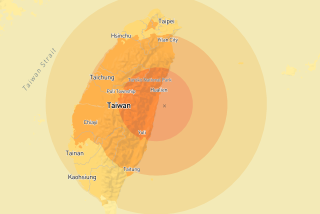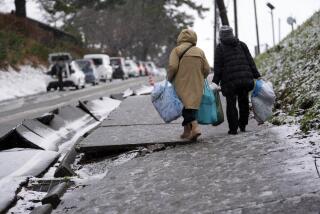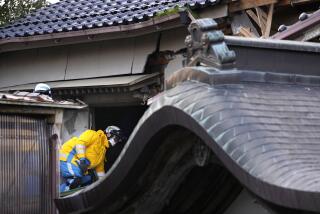Tsunami survivors ride Rose Parade float showing U.S.-Japan friendship
Even three years later, high school student Yui Karino can’t think about Japan’s 2011 tsunami without bursting into tears. The massive undersea earthquake that sent towering black waves into her town engulfed the local elementary school, carrying away her younger sister, Ai, and more than 70 of her classmates.
But she said unforgettable acts of kindness also blossomed from that March 11 disaster: The blankets delivered by military rescue workers. The warm rice balls from local teachers. The gift of music from foreign volunteers; Yui recalled how banging drums with them “set my heart free” from stress and grief.
And now, the disaster has led to her first visit to Los Angeles and the chance to participate in the 126th Rose Parade as part of a new cultural exchange program for teenage survivors of the earthquake and tsunami in northern Japan. Under the program, sponsored by American Honda Motor Co., 20 teenagers met Wednesday with the U.S. military service members who assisted them. They will ride Honda’s lead float together Thursday, among other highlights of their two-week stay.
“The earthquake was a terrible disaster, but I was able to participate in this program because of it,” said Yui, 18, who survived because she was at home on higher ground that day. “I feel I have to stay strong for the people who support me.”
The exchange program exemplifies the theme of U.S.-Japan friendship, as portrayed by Honda’s float entry this year. The float features iconic imagery of both countries — the Statue of Liberty, Stars and Stripes and roses for the United States; a traditional torii gate, cherry blossoms and the red sun of Japan — with a bridge between the two sides symbolically connecting them. The float also features elements suggested by the students that represent Japan’s northern area, including a tuna, rice, regional cherries and colorful streamers from the famous Tanabata Festival.
Ten video screens will broadcast Department of Defense footage of the tsunami relief operation and New Year’s messages.
Scott Van Buskirk, the retired U.S. Navy vice admiral who commanded the relief effort’s maritime and aviation resources, said more than five decades of close military and political cooperation with Japan helped both sides smoothly pull off Operation Tomodachi (Friend). Things were stickier with relief efforts for the Indonesian tsunami a decade ago, he said, because officials there projected more “wariness” about U.S. intentions.
In Japan, the U.S. Seventh Fleet offered more than half of its resources, including 20 ships, 140 aircraft and 20,000 sailors and Marines to deliver relief supplies, clear debris, reopen ports and survey topography to identify damage. One of the biggest operations involved restoring Sendai Airport, which was submerged under seven feet of water and 300 tons of autos, houses and other debris. The U.S. military brought in portable air traffic control systems, forklifts, cranes and fuel and had the air field cleared for relief flights within a day and fully functional in about a month, U.S. Air Force Col. Robert Toth said.
“It was seamless, as we worked side-by-side with Japanese counterparts,” Van Buskirk said. “Unfortunately, sometimes it takes a crisis to highlight how strong a relationship is.”
Honda, the Rose Parade’s biggest sponsor, hopes to nurture such bonds among younger generations in its cultural exchange program, said Steve Morikawa, the firm’s assistant vice president of corporate community relations. The students, who are staying with American host families, were scheduled to visit USC, UCLA and North High in Torrance, Disneyland, Little Tokyo, the American Red Cross and Aquarium of the Pacific.
Over the next three years, Honda plans to bring teenagers from each of the three prefectures affected by the quake and tsunami to Los Angeles; the first group is from Miyagi, which suffered the greatest losses with more than 10,000 people killed or missing.
The nonprofit U.S.-Japan Council is working with other corporations to start similar exchanges, he said.
“It’s going to be a complete network of hopefully hundreds of companies to continue building bonds of friendship among new generations of students,” Morikawa said.
In interviews this week, Yui and other survivors described how their harrowing experiences transformed their lives and aspirations.
Momoko Akama, 18, said she dreams of building a school in Africa after the hardship of living two weeks without gas, water and electricity and the shock of seeing her grandparents’ neighborhood flattened and their home washed away.
“I was shaken when even an advanced country like Japan became completely powerless against the disaster,” she said. “Experiencing a life with no water and barely any food opened my eyes to the fact that there are actually people who live with that kind of situation every single day, and it made me want to do something to help.”
Nozomi Kosuga, 17, recalled the terror of watching the massive waves swallow her town from the third floor of a retirement home where she and her family safely took refuge. She was comforted by an elderly woman in a wheelchair, she said, inspiring her to find ways to do the same for others.
Other students said their experiences had fueled the desire to become the kind of professionals who helped them recover: doctors and nurses, nutritionists and teachers, architects to design safe houses and tourism specialists to reach out to those around the world who helped them with aid, visits and letters.
Foremost in their gratitude, they said, are the U.S. military service members who helped rescue and rebuild their communities.
On Wednesday, they formally expressed their thanks, then joined with service members from all four branches of the military to place roses on the Honda float.
Then, with giggles and smiles, they exchanged high fives with the men and women in uniform, asked for their autographs and mugged for pictures.
“Everyone is so kind, so kind that it makes me want to cry,” Yui said.
Twitter: @teresawatanabe
More to Read
Start your day right
Sign up for Essential California for news, features and recommendations from the L.A. Times and beyond in your inbox six days a week.
You may occasionally receive promotional content from the Los Angeles Times.






